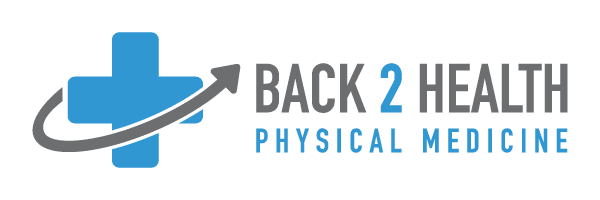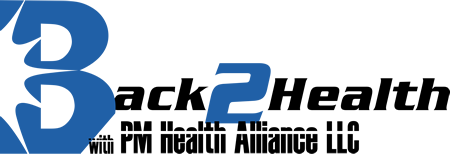Mount Pleasant

Accidents are just a part of life. They can happen at work, home, or even on the road. And when accidents happen, injuries often follow. According to the CDC, the number of injury-related visits to the ER was more than 38 million in 2020. But not all injuries require the same treatment. Minor sprains and bruises can often be treated at home with rest, ice, and elevation. Other, more serious injuries necessitate ongoing care like sports rehab and physical therapy. As a combination of physical exercises and education, physical therapy in Mount Pleasant, SC, has incredible benefits for those who are injured or in constant pain. For many patients and pain sufferers, physical therapy is the key to a pain-free life - one without constant worry and debilitating pain, where joints and muscles don't ache, and everyday activities are easy to accomplish.
That's where Back 2 Health Physical Medicine comes into play: to help you rediscover the lifestyle you used to love.
Contact Us For Services
Book an AppointmentService Areas
What Our Clients Say
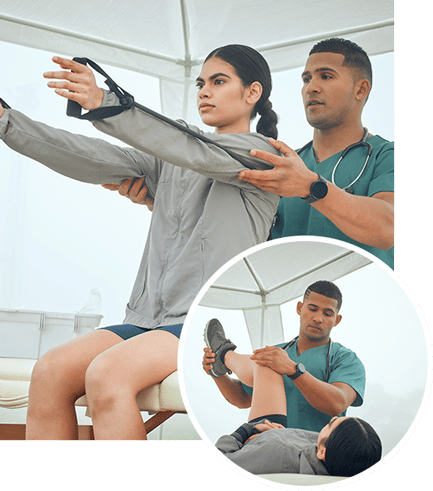
Physical Therapy in Mount Pleasant, SC Tailored to Your Body
Physical therapy centers around correcting impairments to your body's muscles, nerves, and even your brain. When you tear a muscle or break a major bone in your body, it's crucial to maintain careful stretching and training as your injury heals. However, trying to handle physical therapy on your own is quite risky. At Back 2 Health Physical Medicine, our team uses multiple diagnostic tools to monitor your injuries as you heal to ensure your treatment is helping to heal your body, not damage it further.
We help many different types of patients recover, from teen and adult athletes who play competitive sports to older adults and seniors who are retired. Our doctors and physical therapists find that immediate care often helps prevent minor issues, like sprains, from developing into serious problems. That's especially true if we can find a misalignment or weakness that led to the injury, to begin with.
When an injury takes you out of the game or affects your daily life, seeking physical therapy can get you back to normal as quickly as possible, without risking further damage. And that's the beauty of physical therapy from Back 2 Health.
Patients rely on our trained physical therapists to help them work through a myriad of issues, such as:
- Sports Injuries
- Car Wreck Injuries
- Spinal Cord Injuries
- Degenerative disc and spinal joints
- Strokes
- Arthritis
- Brain Injuries Affecting Muscle and Nerve Response
- Pre and Post Surgical rehab and Conditioning
- Neuropathy, Numbness, Tingling
- Much More
Unlike other physical rehab centers, however, we provide more than just physical therapy. Instead of focusing on one pain-relieving discipline, our team utilizes physical therapy along with medical therapeutics and research-backed solutions to give patients a multi-discipline approach to healing. We don't just have one or two physical therapists at your service - we have an entire team dedicated to your recovery, including:
- Medical Doctors
- Nurse Practitioners
- Massage Therapists
- hiropractic Experts
- Physical Therapy and Rehab Specialists
An Innovative Approach toPhysical Medicine
At Back 2 Health, we believe the very best results are achieved by giving patients personalized treatment and access to a comprehensive list of rehab services. Our doctors and physical therapists do more than treat pain - we treat patients. Our goal is to completely restore the quality of life you deserve. We accomplish that goal by using all our resources to treat your pain, from the bottoms of your feet to tips of your triceps and everything in between.
And with decades of combined experience, we understand that no two patients or their injuries are exactly the same. The causes of back pain, foot pain, arthritis pain, and other types of pain are broad and change from patient to patient. The treatment of those conditions, then, must also have a broad range of pain treatment tools.
That's why, when you trust Back 2 Health Physical Medicine, you can rest easy knowing your treatment plan is crafted for you and your body - not someone within your age and weight range.
Our team treats a wide range of conditions, including:
- Back Pain
- Ankle Pain
- Foot Pain
- Knee Pain
- Shoulder Pain
- Wrist Pain
- Chronic Pain
- Muscle Pain
By taking a focused approach to physical therapy, we can better understand your needs and the conditions causing your pain. Whether you're suffering from carpal tunnel syndrome or sciatica, our doctors and therapists have the tools and training to provide relief. And we keep doing it until you're back on your feet and back to your life.
And that, in a nutshell, is what separates Back 2 Heath from the rest of the pack: nuanced medical and physical therapy in Mount Pleasant, SC, that helps you rediscover what healthy, pain-free living is all about. During rehab, our therapists may use resources like massage therapy, chiropractic care, and even medical injections for a more well-rounded approach to your recovery.
Enjoy Long-Term Healthwith Chiropractic Care
Many of the patients we see who are injured report that conventional methods like pain meds and surgery don't really solve their pain problems - they just mask them. When you throw in the risks associated with surgery and pain meds, alternatives like chiropractic care make a lot of sense. If you're looking for a safe, non-invasive treatment, combining the benefits of physical therapy with chiropractic adjustments is a great option for pain relief and overall well-being.
At Back 2 Health, our chiropractic physicians diagnose and treat patients with health problems associated with the body's muscular, nervous, and skeletal systems.
Contact Us For Services
Free Consultation (843) 258-5401
(843) 258-5401
The Benefits of Chiropractic Care
As the saying goes, a healthy spine equals a healthy person.
Just about every type of chiropractic care revolves around your spine. When your vertebrae are misaligned, the nerves surrounding them become compressed, resulting in pain. When a chiropractor restores your spine's natural alignment, it reduces your pain and other medical symptoms. To achieve pain relief, Back 2 Health chiropractors use focused pressure to restore healthy vertebrae motion and loosen frozen joints. This process allows the nerves along your spine to properly function and carry messages to and from your brain.
There are many benefits of using chiropractic care alongside physical therapy in Mount Pleasant, SC, and other solutions like massage therapy. Some of the most common benefits of chiropractic care include:

Less Neck Pain
Sitting in one spot for hours or frequently bending at work can cause horrendous neck pain. Whether from work or a car accident, our chiropractors ease that pain by realigning your spine, which reduces the tension on your neck.

Eases Back Pain
The American College of Physicians says that doctors should recommend non-medical treatments for back pain prior to surgery. Chiropractic care helps tremendously in this regard, correcting subluxations through techniques like spinal decompression.

Helps Relieve Headaches
If you suffer from tension headaches that start in your upper spine or neck, chiropractic care may be the solution you need for relief.

Can Help Prevent Opioid Reliance
Unfortunately, many people with back pain become addicted to pain meds like opiates. However, a study by the NIH found that adults who visited a chiropractor weren't as likely to receive an opioid prescription for pain when compared to those who only visited a medical doctor.
The Back 2 Health Chiropractic Care Process
Our team of chiropractic doctors excels at finding and analyzing improper vertebrae placement. Once those areas are discovered, they use advanced techniques to correct subluxations, returning your body to its proper alignment. This strategy is key in correcting vertebral subluxation complex, which can affect your long-term health and how your body functions.
Like other practitioners, our chiropractors follow common standards and procedures to diagnose and treat you with chiropractic care. On your first visit, we'll get your medical history, conduct physical, orthopedic, and neurological examinations, and may order lab tests for further info. We may also use X-rays and other essential tools to focus on your spine and its proper function.
If needed, our chiropractors may conduct a postural and spinal analysis to discover if vertebral dysfunction is affecting your nervous system or causing a skeletal imbalance, which lowers disease resistance and causes additional pain.
Contact Us For Services
Free Consultation (843) 258-5401
(843) 258-5401
Enjoy Long-Term Healthwith Chiropractic Care
Massage has been used for thousands of years to promote relaxation and relieve pain. And while most people think of getting a massage as a treat, purposeful massage therapy demonstrates an incredible ability to heal and restore overall wellness. In fact, modern applications have been proven to be very effective when used to supplement physical therapy. A complete review by the Institute of Work and Health found that massage had measurable effects vs. placebo treatments. That's excellent news for patients who need physical therapy to help heal injuries.
The benefits of massage therapy for issues like back pain and shoulder pain are numerous and include the following:
- Improved Circulation - Massage therapy helps blood move through congested areas, improving your body's ability to function.
- Accelerated Injury Recovery - Rehabbing an injury can be a long, arduous process. Massage therapy accelerates your recovery, keeps you relaxed, and helps motivate you to continue physical therapy in Mount Pleasant, SC.
- Help with High Blood Pressure - Massages have been shown to lower your blood pressure in an all-natural way.
- Better Posture - Weather due to an unresolved injury or aging, stiff and overworked muscles often result in bad posture. Massage can help relax your muscles and tendons, bringing your body back to its original alignment.
- Improved Athletic Performance - Athletes who endure minor injuries on the court or field use massage to recover faster, allowing them to get back to training so they can improve.
- Complementary Treatments - At Back 2 Health, we use massage to complement other services that our clinic offers, such as physical therapy, chiropractic care, and medical injections for pain or inflammation.
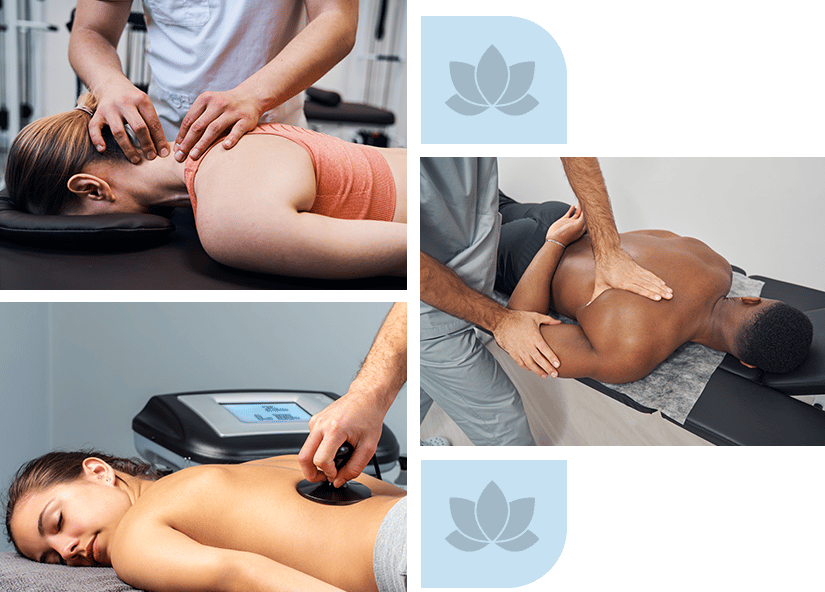
Our physical therapy clinic offers several types of massages, including:
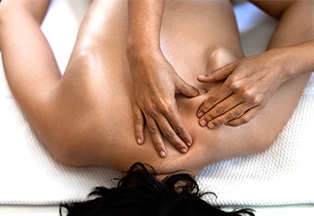
Deep Tissue Massage
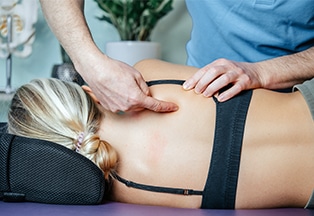
Myofascial Release

Neuromuscular Therapy
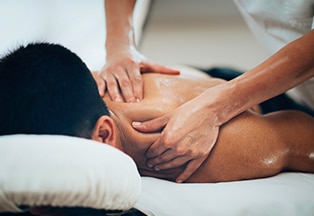
Sports Massage
What Conditions Are Treated with Massage Therapy?
If you're suffering from a long-term condition like neck pain, back pain, shoulder pain, or arm pain, massage therapy could be a great option to consider. Though massage can't always solve issues like inflammation, it can help relieve painful symptoms and works very well when used as part of the multi-discipline approach at Back 2 Health Physical Medicine.
Massage can help treat many conditions, such as:
- Compressed Nerves
- Carpal Tunnel Syndrome
- Migraines
- Sciatica
- Muscle Tension
- Tennis Elbow
- Frozen Shoulder
- General Physical Pain of the Neck, Back, Shoulders
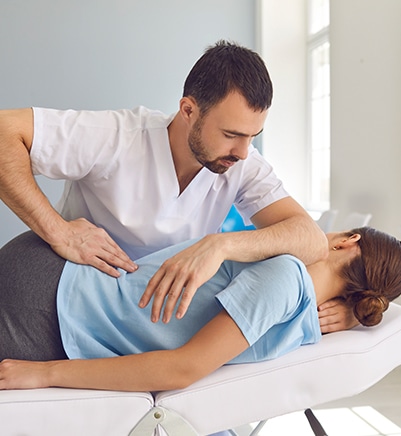
Inflammation & Joint Injections: Pain Relief When You Need It Most
If we're being honest, few people look forward to a medical procedure that involves needles. But the proper injection may reduce or even eliminate joint, nerve, muscle, or spinal pain plaguing you for years, all within a few hours. At Back 2 Health, we combine medical injections for immediate relief with other treatments like physical therapy in Mount Pleasant, SC, that repair factors causing inflammation in your body, providing permanent results.
In many cases, inflammation is a good thing - it helps heal injuries and subsides when the healing process is finished. In many cases, however, inflammation doesn't go away. It actually becomes counterproductive, causing severe pain, swelling, restricted movement, and even structural damage that prevents normal bodily function.
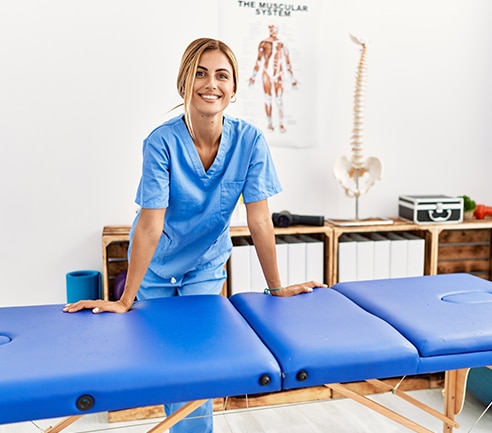
What Are Inflammation and Joint Injections?
Joint and inflammation injections from Back 2 Health help relieve pain and inflammation by reducing blood flow and limiting immune system cells at the affected joint. These injections typically contain a corticosteroid and an anesthetic. The corticosteroid helps with inflammation by limiting blood vessel dilation, while the anesthetic helps with immediate relief of pain.
Generally, joint and inflammation injections can serve two purposes: for pain relief and for diagnostic purposes. As a diagnostic tool, these injections can help our doctors identify the source of pain you're enduring. As a pain reliever, injections help reduce inflammation around the affected joint, providing localized pain relief with few, if any, side effects.
Contact Us For Services
Free Consultation (843) 258-5401
(843) 258-5401
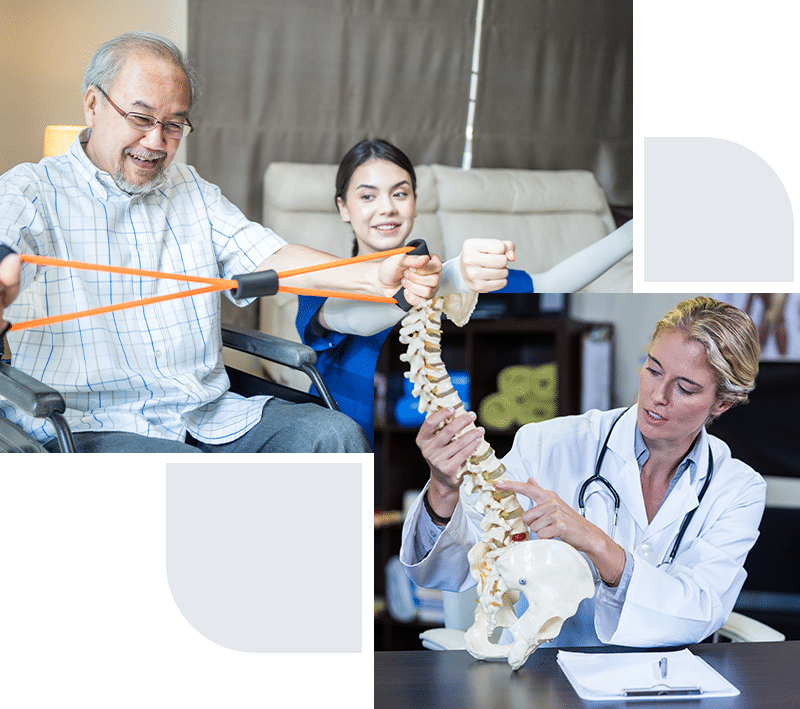
What Are the Benefits of Inflammation and Joint Injections?
Patients who qualify for medical injections from Back 2 Health enjoy a number of short and long-term benefits, including:
- Quick Relief - If you're suffering from intense pain, an inflammation injection may provide relief before you leave our physical medicine clinic in South Carolina.
- Localized - Because these injections can be applied to a specific body part, like your knee, your irritation can be solved without affecting your whole body.
- Long Lasting - One medical injection at our office can help with pain and inflammation for weeks, not hours.
- More Movement - If you're suffering from severe inflammation, an injection from Back 2 Health can help restore your range of motion.
- Dependability - Medical injections should still work even if you have grown accustomed to pain medicines and opiates.
- Side Effects - Unlike invasive surgeries, you won't have to miss days or weeks away from work so that you can recover.
Patients at Back 2 Health Physical Medicine use joint and inflammation injections for a variety of conditions, such as:
- Pinched Nerves
- Back Pain
- Neck Pain
- Hip Pain
- Inflammation
- Chronic Pain
- Sciatica
- Joint Pain Due to Injuries
- Shoulder Inflammation
- Much More
Trust the Back 2 Health Difference for Physical Therapy in Mount Pleasant, SC
If you're looking for a truly personalized, complete approach to physical therapy and pain relief, contact Back 2 Health Physical Medicine today. As a team, we analyze every new patient's case and craft a customized medical treatment plan tailored to their needs. But unlike other "pain" clinics, we don't rely on one form of therapy.
Our doctors and specialists use massage therapy, chiropractic therapy, medical injections, and other treatments to give you long-term relief - not a short-term "band-aid" that only lasts for a few days. If surgery and opiates are off the table, contact our office to learn more about the Back 2 Health physical therapy difference.
Contact Us For Services
 (843) 258-5401
(843) 258-5401
Make an Appointment
Latest News in Mount Pleasant, SC
History of Lowcountry Winter Storms – Mount Pleasant Firsts
Mount Pleasant Magazinehttps://mountpleasantmagazine.com/2023/around-town/history-of-lowcountry-winter-storms/
If you’re dreaming of a white Christmas, you’ve come to the wrong place. It’s not likely that snow will be in our forecast for the holidays, but in these days of wacky weather, you never can tell. We’ve had our share of sunny and warm Christmas days here in the Lowcountry, but there have also been a few harbingers thrown in. In 2018, just after the holidays ended – and two days after the new year was ushered in with temperatures in the 70s – the year started out with more than 5 inches of snow, the third h...
If you’re dreaming of a white Christmas, you’ve come to the wrong place. It’s not likely that snow will be in our forecast for the holidays, but in these days of wacky weather, you never can tell. We’ve had our share of sunny and warm Christmas days here in the Lowcountry, but there have also been a few harbingers thrown in. In 2018, just after the holidays ended – and two days after the new year was ushered in with temperatures in the 70s – the year started out with more than 5 inches of snow, the third highest amount ever recorded here. The snowfall was followed by nearly a week of below-freezing temperatures and highs reaching only into the teens. Drivers were warned to stay off the roads due to the hazardous icy conditions, but several fatalities occurred when people attempted to simply walk on the ice.
Another bizarre winter storm that many long-time locals remember is the 1989 snowstorm, which happened just three months after Hurricane Hugo wreaked havoc. That one did give us a white Christmas – and even provided a bit of Christmas magic by covering up the mounds of debris and devastation that the hurricane had left behind. Eight inches of snow fell from the evening of Dec. 22 to the 23 and stayed around through Christmas Day.
But even without snow in the mix, there have been terrible ice storms when sleet and freezing rain has chilled the Lowcountry to the core, like in January 2011 when icicles draped live oak and palm trees as well as power lines. That meant many folks lost electricity when those power lines came crashing down—which made things pretty miserable since it meant that many homes had no heat. Along the coast, nearly an inch of ice accumulated. Three years later, the Lowcountry was hit with two consecutive ice storms – one in January and an even more severe one just weeks later which brought a third of an inch of freezing rain. That one forced the authorities to close the Ravenel Bridge when giant icicles hung on the bridge’s cables and later fell onto unsuspecting vehicles.
Even though such occurrences might (thankfully) be the exception rather than the norm for our area, early European settlers in the Lowcountry found that their new home would have its trials and tribulations during the winter. A local newspaper, the South Carolina Gazette, reported on Jan. 2, 1737, that frozen ponds and creeks were covered with a layer of ice 3 inches thick.
But winter storms don’t confine themselves to January, often considered the coldest month of the year. On Feb. 12, 1899, a severe blizzard blasted most of the Southeast, including the Lowcountry. Temperatures here plummeted to 7 degrees F and 4 inches of snow blanketed our area. Another February storm occurred in 1934. Lowcountry resident Yvonne Kanapaux said her parents got married on Feb. 10 during that ice storm. She remembered being told that her father had always jokingly predicted that “it would be a cold day in hell when he got married!” And February 1973 brought a record snowfall of 7 inches. Some locals seized that opportunity to use the old Cooper River Bridge as a ski slope.
The winter of 1784 proved to be a particularly bizarre set of weather anomalies. Due to the El Nino effect ushering in unusually cold temperatures to eastern North America coupled with the effects of an atmospheric low caused by a volcanic eruption in Iceland, frigid water temperatures froze up Charleston Harbor. It was reported at the time that some daring local residents ice skated on the surface of the harbor. Hard to imagine, but fact or fiction, it does allude to an extreme weather event.
Snow and icicles adorning the Palmetto State’s namesake trees might make for an interesting holiday photo replacing the iconic images of snow that appear on commercially produced Christmas cards – scenes that Lowcountry residents have never been able to relate to anyway. But when Old Man Winter pays a visit to our area, it’s not exactly picture-perfect. So this holiday season, just be careful what you wish for!
By Mary Coy
Print Whose Cause? Your Cause! Thriving Print Company Fills Gap in Nonprofit Industry Local Cheerleaders Rally for Community Change: Girls of Fall A Lowcountry In Bloom: The Gardens Are Open, So Come On In
Republic DMG to Open Zachary's Daiquiries on King Street
MyLo Lowcountryhttps://www.mylolowcountry.com/mount-pleasant/republic-dmg-to-open-zachary-s-daiquiries-at-460-king-street/
Republic Development & Management Group, the South Carolina-based hospitality group behind Republic Garden & Lounge, Bourbon N’ Bubbles, MESU, and Lamar’s Sporting Club, has announced plans to open Zachary’s Daiquiris – a frozen daiquiri destination. The venue is slated to open in the former home of Basil in late spring 2024.Zachary’s Daiquiris also known as Zach’s Daiqs, will be located at 460 King Street near the corner of Ann Street. Republic DMG says the venue will be "full of energ...
Republic Development & Management Group, the South Carolina-based hospitality group behind Republic Garden & Lounge, Bourbon N’ Bubbles, MESU, and Lamar’s Sporting Club, has announced plans to open Zachary’s Daiquiris – a frozen daiquiri destination. The venue is slated to open in the former home of Basil in late spring 2024.
Zachary’s Daiquiris also known as Zach’s Daiqs, will be located at 460 King Street near the corner of Ann Street. Republic DMG says the venue will be "full of energy, retro flair, and sophisticated funk." Patrons can expect to see a collection of 12 frozen cocktail offerings such as the espresso martini, paloma, froze, classic daiquiris, a variety of margaritas, as well as non-alcoholic options. Zach’s Daiqs will also offer a lite culinary menu, spearheaded by Executive Chef of Republic DMG, Michael Watson.
With over 2,500 square feet, the interior design is led by Courtney Perillo, Owner and Principal Designer of Courtney Perillo Interiors. The venue is adorned with floor-to-ceiling windows allowing natural light to fill the space. Additionally, there is an outdoor patio along Ann Street.
Zachary Elliott was born and raised in Greenville, South Carolina and is a living testament to the power of overcoming adversity. His story began at the age of nine years old, when he was diagnosed with bone cancer, a diagnosis that carried a daunting 10% chance of survival. Undeterred, Zach faced chemotherapy and the amputation of his leg, enduring years of surgeries and adapting to life with prosthetics, all with the support of medical professionals. Zach’s pursuit of life's possibilities led him to the College of Charleston, and later to Florida, where he joined forces with his father. The year 2016 brought another twist of fate as he faced the heart-wrenching loss of his father. Zach’s journey continued in 2022 as he teamed up with Lamar Bonaparte, Owner of Republic Development & Management Group, a collaboration that ignited new passions and possibilities. Through the years, the concept of Zach's Daiqs had been a cherished idea that is about to come to light.
Zachary’s Daiquiris believes in giving back to the community and a portion of proceeds will be dedicated to supporting the fight against childhood cancer.
“It's our way of turning challenges into opportunties and making a positive impact on the lives of others,” said Elliott. “Join us in savoring the sweetness of life and helping us make a difference, one sip at a time.”
Hours of operation are slated to be 12 pm to midnight, Monday through Sunday. For more information on Republic DMG, and the upcoming debut of Zachary’s Daiquiris, visit https://republic-dmg.com.
$2.4B deal buys 3 South Carolina hospitals, including Mount Pleasant facility
Ross Nortonhttps://charlestonbusiness.com/2-4b-deal-buys-3-south-carolina-hospitals-including-mount-pleasant-facility/
Listen to this articleThree area hospitals have been sold in a $2.4 billion deal to North Carolina-based Novant Health by the previous owner, Tenet Healthcare of Dallas, Texas.The sale of East Cooper Medical Center in Mount Pleasant, Hilton Head Hospital in Hilton Head and Coastal Carolina Hospital in Hardeeville includes the associated physician clinics and other operations, according to a news release from Novant Health.“We are beyond thrilled to welcome our new team members...
Listen to this article
Three area hospitals have been sold in a $2.4 billion deal to North Carolina-based Novant Health by the previous owner, Tenet Healthcare of Dallas, Texas.
The sale of East Cooper Medical Center in Mount Pleasant, Hilton Head Hospital in Hilton Head and Coastal Carolina Hospital in Hardeeville includes the associated physician clinics and other operations, according to a news release from Novant Health.
“We are beyond thrilled to welcome our new team members and grow our presence in South Carolina,” said Carl S. Armato, president and CEO, Novant Health, which is headquartered in Winston-Salem. “Novant Health’s long-term vision is to transform the health and wellness of these communities through expanded specialty services and clinical expertise. We are energized and united behind our cause to create a healthier future together by building connections with patients and clinicians in coastal South Carolina.”
The East Cooper Medical Center includes 15 physician clinics. Hilton Head Hospital includes the Bluffton Okatie Outpatient Center and 12 physician clinics. Coastal Carolina Hospital in Jasper County includes the Tidewatch Free-Standing Emergency Department in Bluffton, according to the news release.
Novant Health said continuity of care is a priority and appointments and procedures will continue as scheduled during the transition period. “We are working closely with our new Novant Health team members to ensure a seamless transition for patients and team members,” Joel Taylor, market CEO of Hilton Head Regional Healthcare, said in the release. “We are eager to move forward together in support of our teams and know decisions will be made with our community’s needs at the forefront.”
“There’s a lot to be excited about when planning for our future,” Tyler Sherrill, CEO of East Cooper Medical Center, said in the release. “Novant Health is known for elevating clinician leadership to provide patients with a trusted health care experience through world-class technology, personal connections and convenient access to care.”
Tenet Health also owns a cluster of imaging centers and urgent care clinics in York, Rock Hill and Fort Mill, but those South Carolina properties were not part of the deal for the coastal hospitals.
“We understand that taking care of our patients starts with taking care of our people, so I’m delighted to join a leadership team that strives to not only be a healthc are provider of choice but also an employer of choice,” Ryan Lee, CEO of Coastal Carolina Hospital, said in the release. “I look forward to expanding the resources available to our team.”
Novant Health supports health and wellness programs in the community, including health education/screenings, community health workers and mobile cruisers. Each year, Novant Health provides hundreds of programs that serve patients, neighbors and some of their communities’ most vulnerable citizens, the company said in the release.
The Novant Health network consists of more than 1,900 physicians and more than 38,000 team members who provide care at more than 800 locations, the release said.
Meet the candidates: Mark Flannery
Anna Sharpehttps://www.postandcourier.com/moultrie-news/news/meet-the-candidates-mark-flannery/article_bd6465d0-621e-11ee-bf7c-e7d85259d6ab.html
Tell me about your professional background and how you feel it makes you a good fit to be a council member.I've been teaching in Charleston County since 2016. This is my 24th year teaching. The local aspect of teaching, most of my career has been in teaching elementary school, but still the local aspect of working in the community where I live has always been something that I really like. Now I'm in North Charleston, so it's the greater community where I live. I think this is a theme of why I've chosen to run for Town...
Tell me about your professional background and how you feel it makes you a good fit to be a council member.
I've been teaching in Charleston County since 2016. This is my 24th year teaching. The local aspect of teaching, most of my career has been in teaching elementary school, but still the local aspect of working in the community where I live has always been something that I really like. Now I'm in North Charleston, so it's the greater community where I live. I think this is a theme of why I've chosen to run for Town Council because I would like to see Mount Pleasant make its own decisions on a local level and be responsible for them and with citizens participating in the process. I lived in France for seven years and I have a Bachelor of Science in French and psychology and a master's degree in educational technology. I've just always been part of the local community and have worked well with others.
What do you feel is the biggest issue facing the town today, and what plans do you have to address this?
I have a daughter, a six-year-old, and we went to James Island yesterday to go rock climbing in James Island County Park. I would like to see the green spaces improved in Mount Pleasant to make it something where travelers don't have to go across town to go to the (County) Park. I know that there’s a bike path in … Laurel Hill County Park and just a dirt road going in a half-mile circle and there are things that we can put back there that would be places you can take your kids and take your family.
The other thing is I think that health all across the United States is a problem. We pay more for healthcare. We have more healthcare issues related to obesity and diet. I would like to be somebody who spreads the message of healthy eating and healthy lifestyles lead to better lives. We have a great little local market there at Boone Hall...we have the Farmers Market on Tuesday and Boone Hall is open the rest of the week.
The results of the Public Input Matters survey found that throughout all seven districts in town, respondents feel that traffic in Mount Pleasant needs to be improved. What are some concrete solutions that you feel can address this?
The traffic in Mount Pleasant and housing in Mount Pleasant — I don’t know if ‘victims of our own success’ is the right word for it. We have a very unique geography here. We are a virtual island in that there's no shortcuts. There's one way in and one way out. You may come across I-526 or I-26 or you go north towards McClellanville and Georgetown up (Highway) 41. There just isn't room.
Today's Top Headlines
I know that the Town Council has a plan and they've already hired a company to look into certain traffic solutions. As a new council member, I'm not sure if I would be able to offer anything different to what they have already decided on.
Another area Public Input Matters survey takers responded to was housing availability. Forty-one percent of respondents felt that affordable housing options should be increased. How do you feel this can be accomplished?
I think it speaks well to the people in Mount Pleasant that we want things for people like affordable housing, but whether or not there is a feasible solution to providing that affordable housing — where are we going to put affordable housing? It makes sense that people want affordable housing but do they want the affordable housing in their backyard?
I want to live locally, I want to buy locally, want to shop locally, but we can't escape the fact that a lot of our local decisions are made on a state and national and global level. How does Mount Pleasant make affordable housing when the interest rates are 7.75 percent? There are things happening on a national level that we just can't control that can make our job of creating affordable housing next to impossible.
Is there anyone who has served as a role model to you, either from politics, past experiences or family members, that you look to and consider while you run for office?
One thing my dad always taught us was sometimes doing the right thing is the hardest thing to do, but you can take solace in the fact that it's the right thing to do. I am a part owner of a restaurant in Washington, D.C. with my brother Eric and when Washington D.C. decided to impose the vaccine mandate on restaurants … we were the only restaurant in Washington, D.C. to actively say no, we're not going to check people's health papers. It was very hard on my brother to do that, and he's such a big part of the local community. What I just really admired was his courage and even though it financially wasn't the best decision. Financially, it wasn't a great decision, but it was the right decision to make and his principles are something that I truly admire and I try to follow that example in my own life.
Friday is last day for Mt. Pleasant residents to weigh in on for multi-use trails
Destiny Kennedyhttps://www.live5news.com/2024/02/02/friday-is-last-day-mt-pleasant-residents-weigh-multi-use-trails/
MOUNT PLEASANT, S.C. (WCSC) - Residents of Mount Pleasant can still provide input on a road improvement project on the Rifle Range Trail and Long Point Trail.The Charleston Moves organization wants Mount Pleasant residents to weigh in on these designs before it’s too late.The Town of Mount Pleasant hosted an in-person meeting to collect community input on the proposed Rifle Range Trail and Long Point Trail segments as part of the Mount Pleasant Way project.For those who could not attend the meeting, online surveys ...
MOUNT PLEASANT, S.C. (WCSC) - Residents of Mount Pleasant can still provide input on a road improvement project on the Rifle Range Trail and Long Point Trail.
The Charleston Moves organization wants Mount Pleasant residents to weigh in on these designs before it’s too late.
The Town of Mount Pleasant hosted an in-person meeting to collect community input on the proposed Rifle Range Trail and Long Point Trail segments as part of the Mount Pleasant Way project.
For those who could not attend the meeting, online surveys are set for residents to vote on.
The goal of the project is to provide safe and efficient infrastructure for everyone to get around the town.
Questions that are featured on the survey ask if the concept is supported and what amenities residents would like to see included in the projects like benches, swings, water fountains and workout stations.
The Long Point Trail would provide continued access between the river crossing and neighborhoods.
The Rifle Range Trail is a proposed multi-use path project that is proposed to run along the west side of Rifle Range Road from the roundabout at Venning Road to Bragg Drive.
Friday is the last day to share your input and click to complete the survey for the Rifle Range Trail and Long Point Trail segments.
Copyright 2024 WCSC. All rights reserved.
Disclaimer:


